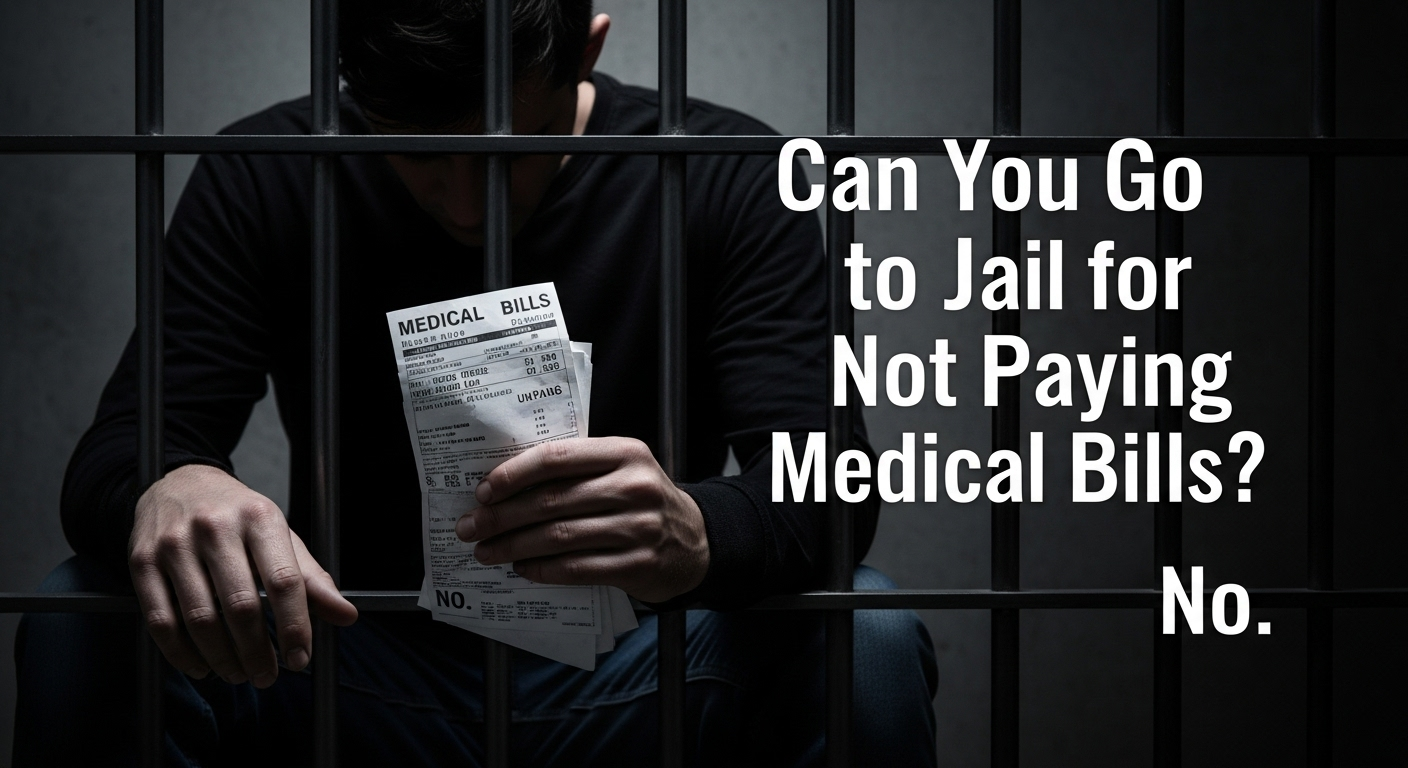A Legal and Practical Guide by Adillazar Medical Billing Service
Introduction
When you’re faced with an emergency medical situation your way the last thing you need to think about is paying for it. However, all throughout the United States, millions of Americans are facing medical bills aren’t able to afford. The rising costs of healthcare, in conjunction with gaps in insurance and sudden emergencies, has caused an economic storm.
One of the most common–and frightening–questions people ask is:
“Can I go to jail for not paying my medical bills?”
The simple answer is not–you can’t be imprisoned simply due to medical bills. But there are instances in which ignoring court orders or debt collection procedures can cause serious legal problems.
We at Adillazar.com Adillazar.com is a firm believer in honesty as well as compassion and education. This blog will provide truth behind medical debt and jail myths, particularly in Utah and how expert billing management can help keep both clients and their providers from legal risks.
Understanding Medical Debt in the U.S.
Medical debt isn’t the same as tax fraud or criminal fines. It’s an credit card debt that is civil which means it’s an individual obligation between you and your healthcare provider. If you receive treatment and are unable to pay the bill there’s no need to be an issue that is criminal.
If the charge is unpaid for long enough it will go through a variety of stages:
- Reminders and billing from the doctor’s or hospital.
- Contact from a collection agency, in the event that the service provider sells or gives the debt to another party.
- Court judgment or lawsuit when the debt is not paid.
- Garnishment, or liens according to the laws of your state.
In the majority of cases the process will end with a garnishment of wages or damage to credit scores, but there is no the possibility of incarceration.
The U.S. Constitution and state laws state that you can’t be imprisoned because you owe money. However certain actions, such as refusing to answer court summons or failing to comply with judgments can result in indirect legal repercussions.
Why People Still Fear Jail for Medical Debt

The anxiety of having to go to prison for unpaid medical bills stems from two fundamental misperceptions:
- Collectors of debt use intimidating strategies.
In the past, aggressive collectors threatened arrest or legal action to induce people to pay. It is now prohibited in federal laws. - Confusion regarding contempt of the court.
When people are sued for not paying bills and do not comply with the judge’s orders to show up in court, the judge may issue an summons for non-appearance.
That arrest is not a result of the debt, but for not following the court’s orders.
The ability to discern this difference is essential. The issue isn’t “nonpayment” but non-compliance.
On Adillazar.com Our experts train clinics and patients on the differences to prevent anxiety and ensure that the proper legal management of disputes regarding medical billing.
The Legal Reality: Debtor’s Prisons Are Gone
In the past, historically, the U.S. had debtors prisons in which people were imprisoned for not paying their debts. However, these were eliminated during the late 19th century. Modern law forbids imprisonment for civil debts, including medical bills.
In the present day America In the present, the Fair Debt Collection Practices Act (FDCPA) protects consumers from threatening, intimidation, or false claims made by debt collectors. This means that no debt collector or hospital has the legal right to threat you to jail time due to not paying bills.
Some people do are in jail due to their inability to answer court summonses in connection with their credit card debt. If a creditor wins a judgment, they are able to demand a court hearing in order to evaluate your financial situation. If you fail to appear in court, you may be found in violation of the law and a judge could issue an order to bench.
Remember: you’re not going to prison to pay the bill, you’re just disregarding the judge.
The Utah Perspective
In Utah as well as other U.S. states, medical debts are treated as an civil matter. However, no Utah law permits direct incarceration for medical bills that are not paid. However there is a possibility that Utah courts may issue bench warrants for defendants who have repeatedly failed to comply with the legal requirements or make court appearances.
For instance:
- If a medical or hospital office is suing the plaintiff within Utah and you do not comply with the demand or demand, the court can make an default judgement in your favor.
- If you fail to comply with further orders (such as not showing up to a hearing on financial disclosures) The judge could issue an Civil bench warrant.
This means that someone can technically be charged with an unpaid medical debt, but only for ignoring court instructions and not due to the actual bill.
How can you avoid the pitfalls? Be proactive, record everything, and don’t ignore official warnings.
This is the point at which Adillazar Medical Billing Service is able to help both patients and providers to navigate the complex billing process before they turn into legal battles.
Why Ignoring Medical Debt Is Risky
While you’re unlikely to be in jail because you haven’t paid your medical bills If you don’t pay them, it can lead to devastating emotional and financial implications. This is what can result if medical debt is not resolved:
- Collection calls or the Credit Damage
Collection agencies can report accounts unpaid at credit agencies. This could result in which can lower your credit score by as long as seven years. - Legal Proceedings and Judgements
hospitals and collection agencies are able to take legal action to recover the debt including legal fees and court costs. - wage garnishment
After an award is made the pay may be garnished (depending on the state’s exemptions). - Levies on Bank Accounts
Customers could be granted the right to withdraw funds directly from your bank account in order to meet the judgment. - Anxiety and Stress
A medical loan can trigger depression, stress and avoidance behavior which can make the situation more difficult.
With the help of a professional in billing management at Adillazar.com A lot of these problems can be avoided through a proactive approach to communication, transparent billing and patient assistance programs.
How Adillazar Medical Billing Service Helps
We are Adillazar Medical Billing Service Our goal is to make medical billing simpler as well as protect patient rights and ensure that healthcare providers receive an equitable amount of money without resorting to aggressive collection strategies.
This is how our services can make the difference:
1. Transparent Billing
We provide clear, simple-to-read statements that clearly outline the charges, insurance and the responsibilities of patients. This eliminates the likelihood of disputes and confusion before they become a problem.
2. Patient Education
We assist patients in understanding their insurance coverage, bills and available payment plans. The first step is to be aware towards financial control.
3. Compliance and Ethics
Our billing practices are in compliance with the federal and state regulations, and we are sure that there is there is no violation of any of the FDCPA and the local Utah laws.
4. Early Intervention
We call patients as soon as we can and with respect to set up affordable payment options, while reducing the risk of lawsuits and defaults.
5. Provider Protection
In managing claims efficiently and legally, we can help hospitals and clinics stay compliant while maintaining trust among patients.
If healthcare providers cooperate together with Adillazar.com it reduces risk of default and also protect their reputation as a community.
Steps to Take If You Can’t Pay Medical Bills
If you’re having trouble paying your medical charges, here’s a step-bystep strategy to protect yourself and your credit without fear of prison time:
- Don’t overlook the bill!
Make contact with your billing service or provider (like Adillazar) as soon as you can. A lot of facilities will negotiate arrangements for payment or hardship adjustments. - Request an itemized statement
Incorrect entries with medical billing can be not uncommon. Examining each charge will identify duplicate charges or mistakes. - Ask about the Financial Aid Program
Numerous hospitals have programs for charitable care, or income-based reductions in payments. - Communicate in Writing
Always document your communication. Written records can help protect your from fraudulent or aggressive collection efforts. - Attend All Court Hearings
If you’re sued, never skip court dates. Failure to show up could cause default judgments as well as potential bench warrants. - Speak with an attorney or Financial Advisor
In the event that the debt becomes too much to handle Get professional advice on your options and rights, including bankruptcy.
Keep in mind that communication is essential. Silence exposes you to legal liability while honesty and documentation provide security.
Frequently Asked Questions (FAQs)
1. Do debt collectors have the right to make me fear jail?
No. It is illegal for a collector to threaten jail or arrest time due to medical bills that are not paid. If you encounter this, immediately report the incident to authorities for consumer protection.
2. What happens if I don’t pay the bill from a hospital?
In the event of ignoring a medical invoice, it could cause debt collection, credit damage and even lawsuits. But none of these are automatically a sign of prison time.
3. Is it possible for a Utah hospital be sued for unpaid bills?
Yes. Utah hospitals are able to make civil suits to recover outstanding balances. You will however receive legal notice of the suit and have the opportunity to contest any decision.
4. How long does medical debt impact my credit score?
Medical debt could remain on your credit file for as long as seven years, however new regulations have made it easier to ease certain credit reporting requirements for small balances.
5. What can Adillazar do for me to with my debts?
On Adillazar.com We provide transparency in billing, education for patients and a compliant collection process which avoid unnecessary escalation and anxiety.
The Truth in One Line
You can’t be imprisoned in the event of not paying your medical expenses.
But disregarding court notifications or failing to respond could result in legal issues that could be avoided.
Conclusion
The notion of being imprisoned for medical bills not paid is a popular, but outdated, myth. In the current U.S. legal system, and particularly within Utah, medical debt is a civil matter and not a criminal issue. You will not be charged just because you owe an ER or hospital.
In the end, disregarding the legal process could result in complications, such as the possibility of bench warrants for omitted court appearances.
For your protection:
- Always respond to official correspondence and court notifications.
- Request financial assistance or negotiate before the deadline.
- Employ professionals who value respect and compassion, like Adillazar Medical Billing Service.
Our goal is to make it easier for patients to understand billing, provide fairness and inform patients about their costs. We believe that no patient should be in a state of fear or uncertainty regarding the cost of healthcare.
If you’re a service provider in search of an efficient, patient-friendly billing partner, or a patient looking for more clarity on your bill, go to Adillazar.com now.





